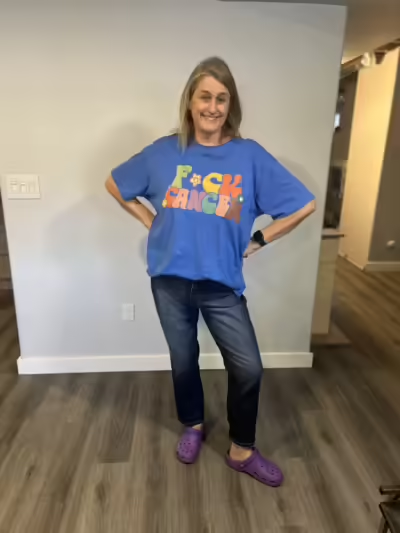In my breast cancer journey, detailed in my book, “Flat Please”, I had firsthand experience of how it feels when the world around you seems to freeze, while life carries on for others. Suddenly, in addition to grappling with the profound personal impact of your diagnosis, there’s another layer to wrestle with: how will it affect your role at work?
What I quickly discovered is that the professional sphere lags far behind when it comes to understanding and supporting employees dealing with a breast cancer or cancer diagnosis. It’s not just about the physical toll, but the emotional and psychological impact as well. The ripples of a cancer diagnosis go beyond the person diagnosed. It impacts spouses, children, extended family, and yes, colleagues and managers at work.
Avoiding Awkward and Inappropriate Conversations With Employees Diagnosed
Most of us diagnosed have been in this situation. It comes up in conversation that we have (or have had) cancer. We are sometimes met with probing and sometimes inappropriate questions, sad stories of loss, and unwanted advice. At work, this can manifest into unrealistic expectations or misguided perceptions of cancer and our ability to work or not work. People feel sorry and sad for us. Then there are others who simply are uncomfortable and awkward around us. They don’t know what to say or feel so they avoid making direct eye contact. Or, they just ignore that we’re in the room — as if our cancer diagnosis has caused us to become invisible.
Up Your Organization’s Emotional Intelligence
One crucial aspect that organizations need to foster amongst their workforce is emotional intelligence (EI). Having a high EI means understanding and managing your own emotions, and effectively doing the same with the emotions of others. It’s about being empathetic, and thoughtful and ensuring an environment wherein a person feels understood, able to express themselves, and genuinely supported. There is still much work to be done to build EI in the workplace. According to the Niagara Institute, employees who have a manager with a high EI are 4x less likely to leave their jobs. That said, the same research shows that only 22% of leaders were found to have a high EI.
When it comes to navigating a cancer diagnosis in the workplace a high EI can make all the difference. Management support is one of the main needs expressed by the cancer survivors when returning to work, followed by a positive environment and respectful and rewarding communication (Greidanus et al., 2018, 2019).
Too often, when it comes to cancer, rather than invest in building a culture of authentic EI, organizations resort to virtue signalling – expressing support for a cause while doing little to effect meaningful change. When an employee is diagnosed with cancer, sending sympathy cards or flowers, walking in a fundraising event for a cause, or making public declarations are ok, but it isn’t enough. These actions, while perhaps well-intentioned, can often feel hollow and insubstantial to the person who is actually living through the experience and personally struggling. An organization that on one level goes all in on Breast Cancer Awareness month, then fails to offer adequate emotional support for an employee diagnosed — or in a worst-case scenario — finds a reason to terminate that person for poor performance is the height of disingenuous behaviour.
Want to make a real difference for employees diagnosed with breast cancer? Do this ->
What really makes a difference in the workplace is offering direct emotional support for the employee and their family. This can involve training for managers and colleagues on how to appropriately support team members navigating through a cancer diagnosis. I should add this extends beyond mere logistics of leaves, coverage and work-from-home accommodations. It involves understanding what to say, how to say it, and creating a supportive environment where the employee feels comfortable discussing their needs and concerns. There needs to be patience, empathy, and genuine understanding, which cannot be stressed enough.
Offering unique benefits, such as AskEllyn @ Work, can be invaluable in providing emotional support for the individual diagnosed and their family. Private, confidential, multi-lingual and available 24/7, AskEllyn provides much-needed companionship and support for everyone impacted by a breast cancer diagnosis. For individuals who are coping alone, or who want to do so privately, or who feel shame surrounding their diagnosis, AskEllyn can be a vital lifeline of support at a very lonely and frightening time.
Rather than look at an employee dealing with a cancer diagnosis as a liability to the business, consider for a minute all the skills it takes to navigate cancer. Resilience, grit, tenacity, perseverance, self-awareness and self-acceptance are also highly prized capabilities in the workplace. I wrote about how cancer made me a better business person in this blog.
Remember, we all have our unique coping mechanisms that help us navigate through stressful scenarios like a cancer diagnosis. In the workplace, having an empathetic and emotionally intelligent structure can alleviate some of this stress and nurture a supportive environment. Facing a cancer diagnosis is already an uphill battle; the least we can do is ensure individuals do not have to face it alone at work.
With one in two people diagnosed with cancer in their lifetime, organizations need to step up their game. The odds are against us. So, cultivating a compassionate, emotionally intelligent workforce that fosters a genuinely supportive environment isn’t just an ethical thing to do; it’s a necessity.




